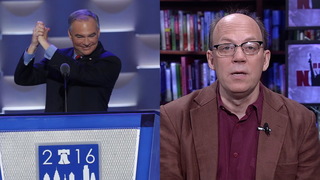
We speak with Annie Bird about Hillary Clinton’s role as secretary of state during the 2009 coup that ousted Honduran President Manuel Zelaya. “There’s no other way to categorize what happened in 2009 other than a military coup with no legal basis,” Bird says. “The U.S. was not willing to cut off assistance to Honduras, and that is the only reason it was not called a coup, a military coup. At the time, activists like Berta called for the assistance to be cut off, and today her children are calling for it to be cut off, because the U.S. assistance is actually adding fuel to the fire and stoking the economic interests of the people behind the coup.”
Transcript
AMY GOODMAN: Finally, I wanted to get your response to our colleague, Democracy Now!'s Juan González, raising the issue of Honduras with Hillary Clinton during a meeting with the New York Daily News editorial board. This was in the midst of the New York primary. And Juan asked about Hillary Clinton's decision at the time she was secretary of state in 2009 to not declare the ouster of then-president of Honduras, Mel Zelaya, a coup.
JUAN GONZÁLEZ: Do you have any concerns about the role that you played in that particular situation, not necessarily being in agreement with your top aides in the State Department?
HILLARY CLINTON: Well, let me again try to put this in context. The Legislature—or the national Legislature in Honduras and the national judiciary actually followed the law in removing President Zelaya. Now, I didn’t like the way it looked or the way they did it, but they had a very strong argument that they had followed the Constitution and the legal precedents. And as you know, they really undercut their argument by spiriting him out of the country in his pajamas, where they sent, you know, the military to, you know, take him out of his bed and get him out of the country. So this was—this began as a very mixed and difficult situation.
If the United States government declares a coup, you immediately have to shut off all aid, including humanitarian aid, the Agency for International Development aid, the support that we were providing at that time for a lot of very poor people. And that triggers a legal necessity. There’s no way to get around it. So, our assessment was, we will just make the situation worse by punishing the Honduran people if we declare a coup and we immediately have to stop all aid for the people, but we should slow walk and try to stop anything that the government could take advantage of, without calling it a coup.
AMY GOODMAN: That’s presidential candidate Hillary Clinton. She was secretary of state at the time of the coup against Mel Zelaya. Annie Bird, we have 30 seconds. Your response to what she said?
ANNIE BIRD: You know, there was just—there’s no other way to categorize what happened in 2009 other than a military coup with no legal basis. The U.S. was not willing to cut off assistance to Honduras, and that is the only reason it was not called a coup, a military coup. Today—and at the time, activists like Berta called for the assistance to be cut off. And today, her children are calling for it to be cut off, because the U.S. assistance is actually adding fuel to the fire and stoking the economic interests of the people behind the coup, supporting—you know, investing not in the poor, but in the wealthy and in the corrupt sectors of Honduras that are, you know, generating so much poverty and violence.
AMY GOODMAN: Well, I want to thank you very much, Annie Bird, for joining us, director of Rights & Ecology, a project of the Center for Political Ecology.
This is Democracy Now! When we come back, we’re going to go to the story of a high school student in North Carolina who was picked up on his way to school and targeted for deportation. He’s remained in jail for many months. Stay with us.












Media Options